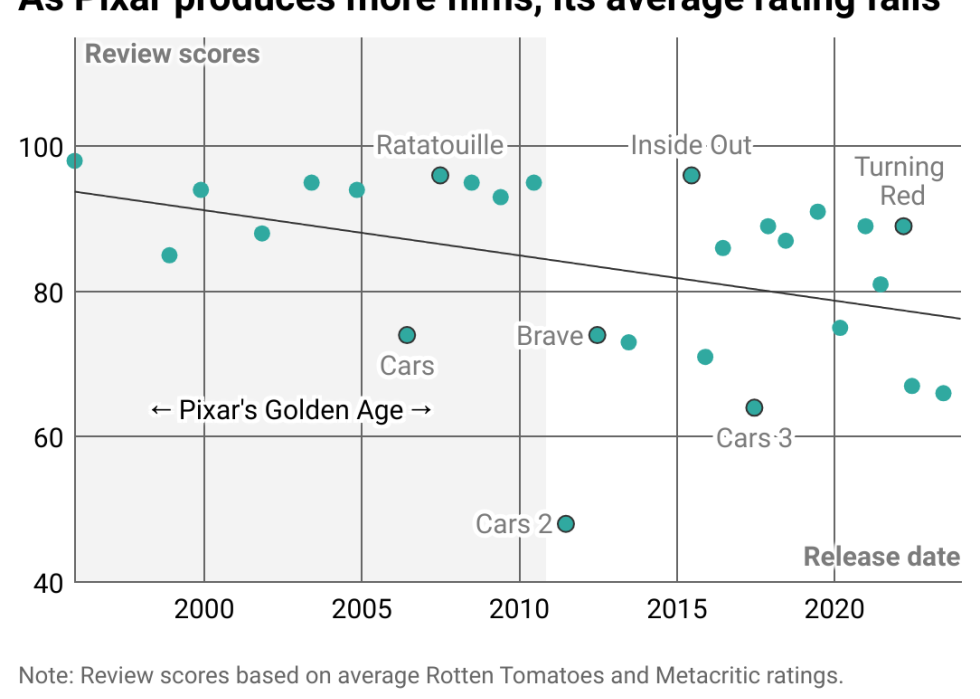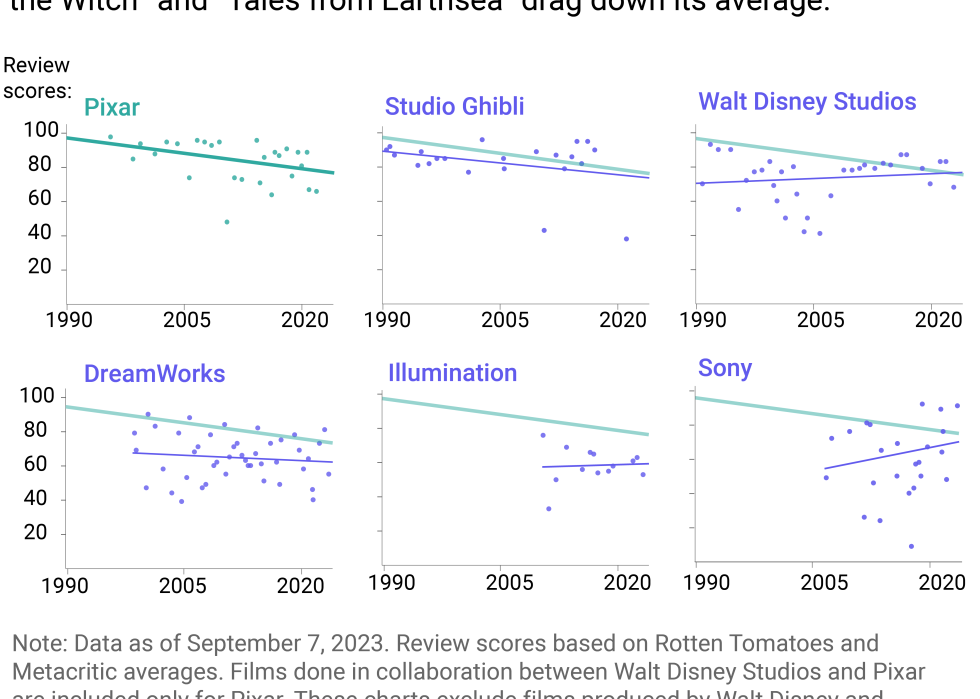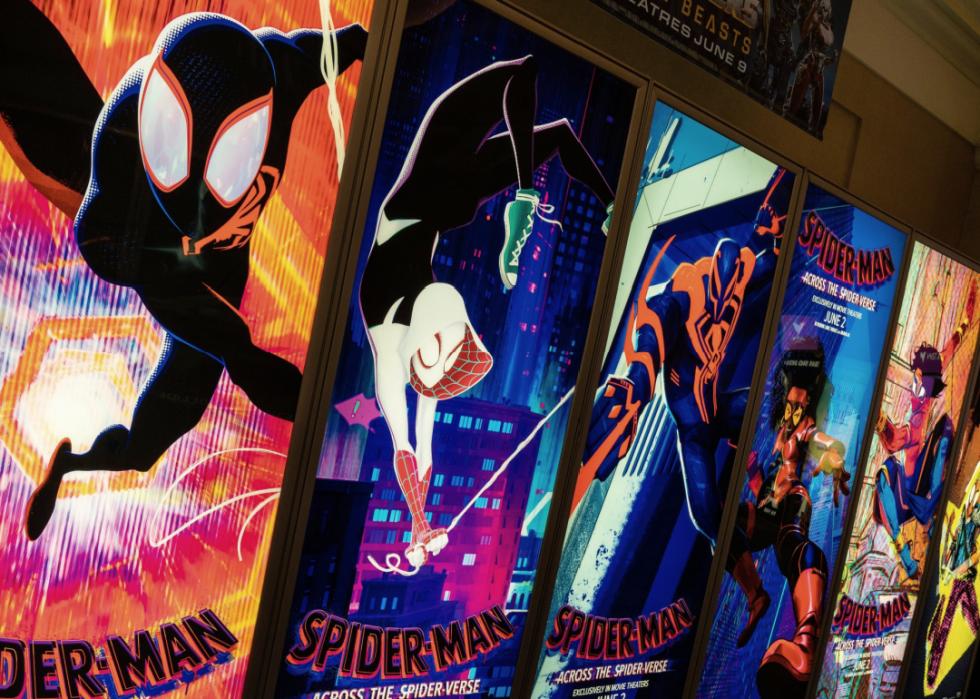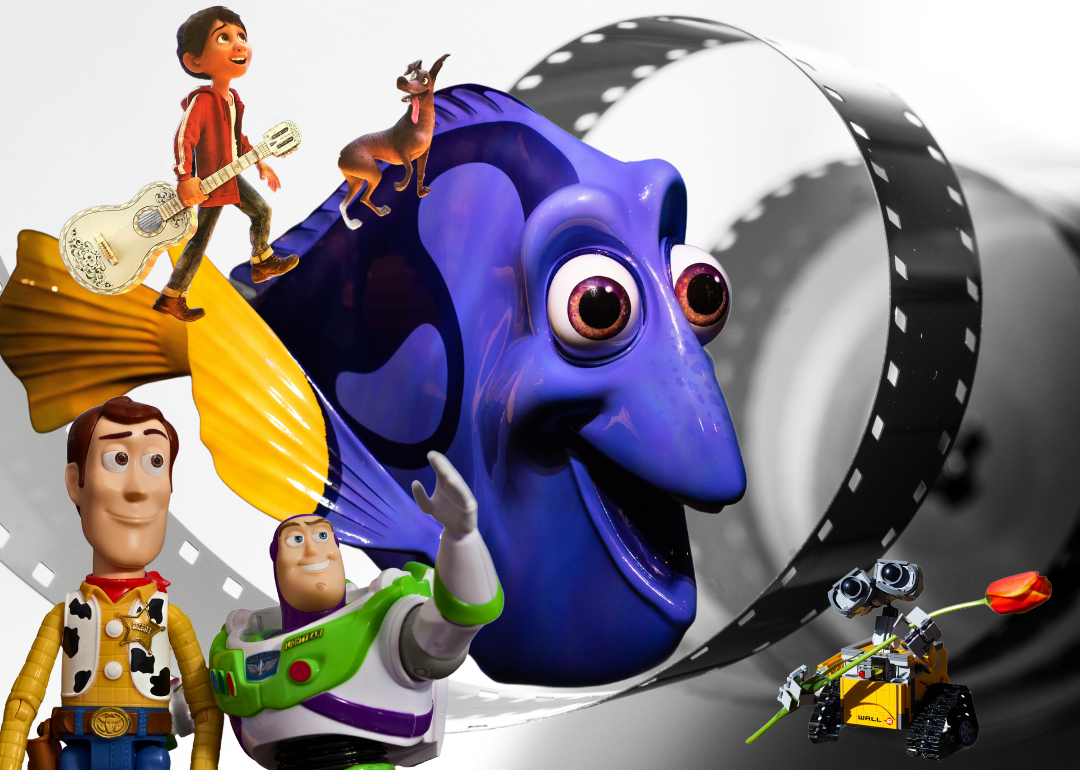Has Pixar's star truly fallen? How this once-golden studio compares to its major rivals.

Pixar's review average for films released before 2011 was 91%, but since then, the average has plummeted to 78%. And its score variance—i.e., how far a film's score deviates from the studio's average—more than triples between those time periods, meaning Pixar has become far less consistent.
Pixar's newest films have largely received a "good but not great" critical response. Before 2011, 10 of Pixar's 11 films scored 85% or higher from the combined critical average (91% of these films), but since 2011, only seven of its 16 films performed as well (44% of these films).
Some of this could be due to Pixar's increased production of sequels and spinoffs. Before 2011, only two of Pixar's 11 films—"Toy Story 2" and "Toy Story 3"—were sequels or spinoffs (18%). Since then, seven of Pixar's 16 films have been sequels or spinoffs (44%), and those films' critical average is a paltry 73%—8 percentage points lower than the original films it produced during the same time. Some of Pixar's decline is surely due to sequelitis, a phenomenon in which as the number of entries in a franchise grows, the quality of said films declines.

A diminished Pixar, however, still stacks up pretty well against some of its major animation rivals.
Pixar's primary critical rival is the Japanese powerhouse Studio Ghibli, which ties with Pixar's career average of 83%. Ghibli has seen its own recent stumbles too, including its disastrously received first foray into CGI 3D-animated films, 2021's "Earwig and the Witch" (38% average). The studio's 10 most recent films average 78%, slightly worse than Pixar's. However, despite being the older studio, Ghibli has made fewer films than Pixar, so its two duds—2010's "Tales from Earthsea" (43% average) and "Earwig"—weigh more on its career average.
Pixar's career average remains at least seven points better than any other American studio in our data, with Walt Disney Animation Studios coming in second at 76%. When looking only at films released between 1995 and 2010—i.e., Pixar's golden era—Pixar outperforms the second-best studio, DreamWorks Animation, by 24 points among studios with at least three films released. However, Pixar's post-2011 average is four points worse than Disney's, but this is as much the result of Disney's resurgence as Pixar's fall. Their averages meet in that "good but not great" middle-ground of a high-70s/low-80s average.

Sony Pictures Animation seems ascendant at first. Its career average is 59%, but its 10 most recent films average 69%—the largest improvement of any studio. However, this is largely due to two films in the same franchise: "Spider-Man: Into the Spider-Verse" and "Spider-Man: Across the Spider-Verse." Excluding them leaves the remaining eight films with a 64% average—an improvement on its career average, sure, but a minor one. Plus, the year before the studio's best-scoring film ever (the first "Spider-Verse" movie in 2018), it released "The Emoji Movie," the worst-performing film in the data (9% average). This suggests Sony is not quite the up-and-coming animation studio it initially appears to be.
Studio Ghibli might finally take the crown, but its future will depend on how well it can weather the (second but probably final) retirement of its head filmmaker and animation legend, Hayao Miyazaki.
If one were to prize consistency about all else, however, the winner is Illumination, which easily holds the lowest score variance across its career. Among its 10 most recent films, none have scored higher than 69% ("Despicable Me 2") or lower than 53% ("The Super Mario Bros. Movie"). Compare that with Pixar, whose 10 most recent films have seen a high of 91% ("Toy Story 4") and a low of 64% ("Cars 3").
With these competitors closing in on the vaunted studio, could Pixar hold on to its place? After "Elemental," Pixar's worst box-office opening ever (adjusted for inflation), the studio may indeed course-correct. Pixar's next two announced projects include a sequel to one of its best-performing films, "Inside Out," and "Elio," an entertaining, intergalactic underdog tale spearheaded by Adrian Molina, the co-director and co-writer of the 2017 hit "Coco."
Of course, it's always possible that a new studio bursts onto the scene, changes the form, and goes to infinity and beyond—or, at least, makes plenty of excellent animated films.
Story editing by Carren Jao. Copy editing by Tim Bruns.
